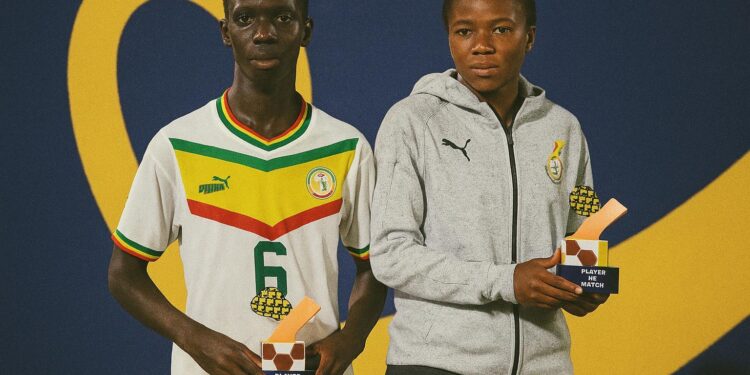Accra Finale Showcases Emerging Excellence
Under the humid skies of Accra, the 2024⁄2025 African Schools Football Championship reached its continental crescendo, producing moments that transcended the usual box-score. The Confederation of African Football (CAF) singled out Ghanaian forward Jennifer Awuku and Senegalese midfielder Souleymane Commissaire Faye as “Players of the Tournament”, a distinction that grants the teenagers a coveted role as ball attendants at the TotalEnergies-sponsored Africa Cup of Nations in Morocco next year. CAF’s communiqué framed the choice as meritocratic recognition of technical flair and exemplary comportment on and off the pitch (CAF release, 17 July 2024).
Beyond Trophies: A Strategic Investment
Speaking from the touchline, CAF Secretary-General Véron Mosengo-Omba insisted that the gesture is “more than an accolade; it is an investment in Africa’s footballing future”. His rhetoric echoes mounting academic literature that positions sport as a catalyst for social mobility on a continent where nearly sixty per cent of the population is under 25 (AfDB Youth Report, 2023). By covering all travel and accommodation costs for the laureates and their guardians, CAF aims to lower the socio-economic barriers that often derail promising athletic careers before they mature into professional trajectories.
Partnership Dynamics and Soft Power
TotalEnergies, a long-standing title sponsor of CAF flagships, viewed the awards as proof of concept for its renewed memorandum of understanding, signed in February 2024 and extending collaboration to 2028 (TotalEnergies press kit, 2024). Vice-President for Brand and Sponsoring, Martin Bertran, characterised the programme as a ‘robust contribution to African youth’. Corporate diplomacy analysts note that Paris-based multinationals increasingly seek reputational dividends through sport, weaving developmental narratives that counterbalance the extractive image historically attached to the energy sector. For CAF, the alignment provides predictable funding streams at a moment when global broadcast revenues face fragmentation.
Educational Spin-Offs Amplify Impact
In parallel with the final, TotalEnergies curated a digital-content workshop for eight adolescents—equally split along gender lines—training them in live-tweeting, match photography and ethical storytelling. The curriculum, designed with Ghana’s University of Media and Communication, reflects a pedagogical shift from passive sponsorship to skills transfer. Participants gained hands-on experience covering semi-final fixtures, whose social-media impressions tripled the federation’s average engagement rate, according to CAF’s analytics unit. UNESCO’s 2022 framework on sport and education emphasises such hybrid models as pivotal to achieving Sustainable Development Goal 4, which champions inclusive quality education.
Looking Ahead to Morocco 2025
Awuku and Faye will next appear on a far grander stage: the 35th Africa Cup of Nations in Rabat, a tournament projected to attract more than one billion cumulative television viewers (Nielsen Sports Forecast, 2024). In addition to proximity to continental icons, the pair will attend daily leadership seminars co-curated by CAF, the Union of North African Football Federations and the Moroccan Ministry of National Education. Organisers argue that exposing teenagers to the logistical and diplomatic dimensions of a major event can seed future careers in coaching, sports law and event management—sectors where Africa’s talent pipeline remains thin but increasingly sought after by international bodies, including FIFA and the IOC.
A Model of Inclusion Resonating Beyond Stadiums
Critics occasionally accuse footballing initiatives of offering symbolic gestures that distract from structural challenges such as grassroots infrastructure and equitable resource allocation. Yet the layered design of the schools championship—combining competition, culture and digital literacy—suggests a more integrated blueprint. By foregrounding female and male athletes in equal measure and ensuring geographic rotation of host cities, CAF aligns itself with continental agendas championing gender parity and regional balance. Diplomatic observers have noted that such inclusive optics resonate in multilateral forums, subtly reinforcing Africa’s collective bargaining power on issues ranging from climate financing to peacekeeping mandates.
Continental Momentum and National Aspirations
Several capitals, including Brazzaville, have already signalled interest in hosting future qualifiers, interpreting the tournament as a low-cost vehicle for nation branding. Republic of Congo’s Ministry of Sports underscored the event’s capacity to ‘galvanise civic pride and reinforce Pan-African solidarity’ during preliminary talks with CAF’s development bureau this spring. While no formal bid has been lodged, diplomatic sources suggest that infrastructure upgrades linked to the government’s broader youth policy could dovetail with CAF’s criteria, potentially positioning Congo-Brazzaville as an emergent node in the federation’s decentralised roadmap.
Echoes for Africa’s Diplomatic Playbook
Ultimately, the honours bestowed upon Awuku and Faye illuminate how football can serve as a versatile instrument of foreign policy, corporate citizenship and societal advancement. In the words of Cameroonian sociologist Francis Nyamnjoh, ‘the game survives by remembering that its boundaries reach far beyond the chalk lines’. As Morocco prepares its stadia and CAF fine-tunes its youth incubator programmes, the symbolic run-up from Accra foreshadows a tournament that promises more than ninety minutes of play. It offers a rehearsal for the continent’s wider quest: harmonising ambition, partnership and homegrown leadership in an interconnected world.












































